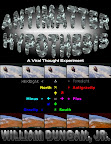The most significant factor contributing to traffic congestion is time on the road (TOTR), a variable strongly correlated with energy consumption. In contrast, the goal of public transit is universal service, which addresses a separate, incompatible problem. Universal service implements a watershed scheme, where arterial routes feed into transfer stations that connect with urban centers, all of which increases patron TOTR while delay penalties mount with distance traveled due to transit stops picking up and letting off passengers.
However, a pooled model minimizes TOTR, conserves energy, and relieves congestion, while eliminating long distance delay penalties, and positively impacts the issues of imported oil and global warming. Only when commuters with the same destination are neighbors do point-to-point ride sharing opportunities exist. One low tech way to promote ride sharing is a street map pinned to a company bulletin board, where pins represent home locations, and then encourage coworkers to become neighbors, and to carpool or van-pool or bus-pool. New behaviors are necessary to put this plan into action. Then tracking changes in fuel consumption at the community level will provide vital feedback on coordinating efforts, while serving as a competitive incentive and raising public consciousness.
Ideas, information, education, tools, feedback, and incentives are all deficient for a coordinated community level response to the problems currently facing us. America's top priority needs to be a major paradigm shift in thinking. The onus on government to deliver watershed answers has eroded personal responsibility and activism. Instead the onus needs to be on pooled efforts, like community organization and personal involvement.
"Problems cannot be solved by the same level of thinking that created them." – Albert Einstein
A serious disconnect exists between conventional solutions and today's problems. Problems get sidetracked by ideologies into ill conceived "solutions" with wasteful implementations that fail to address the underlying problems.
America is suffering from industrial age attitudes. War, mass transit, factory style schools, etc. are technical solutions to social problems, and symptoms of a systemic meltdown. Living in an information vacuum expecting government to deliver watershed solutions to social problems is misplaced loyalty. As a remedy, America needs to embrace information age, coordinated, parallel, distributed paradigms, which require community organization, dissemination of information to appropriate levels, personal involvement and commitment, and frequent reality checks. The pooled model not the watershed model.
Public education is one indispensable role of government. Now more than ever we need to rewrite the textbook. Conventional wisdom got us into this mess. It's going to take unconventional wisdom to get us out of it.
Mortgage Crisis Solution
11 years ago








